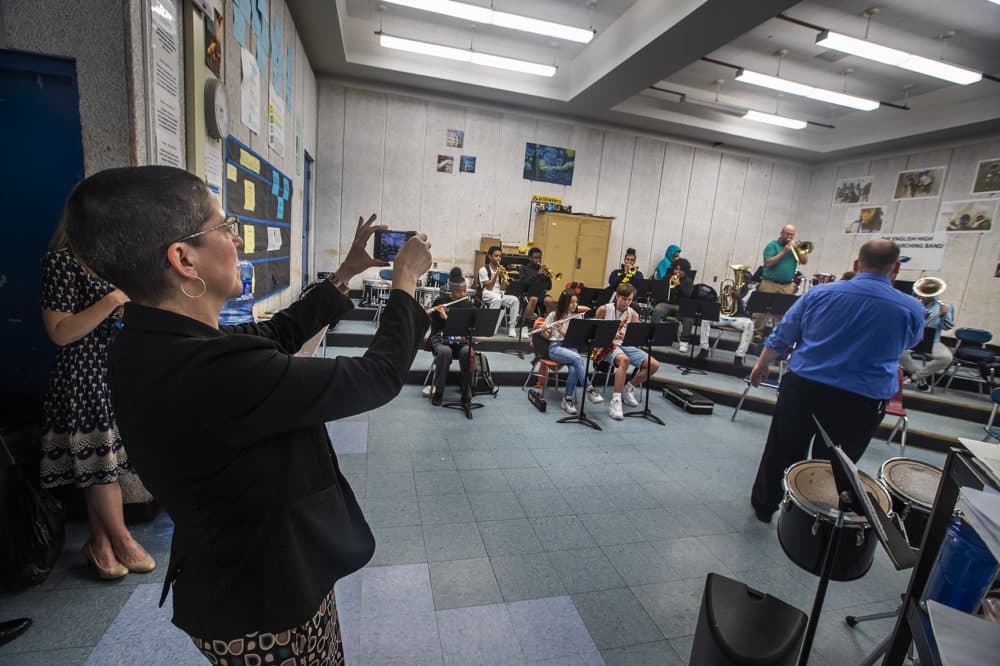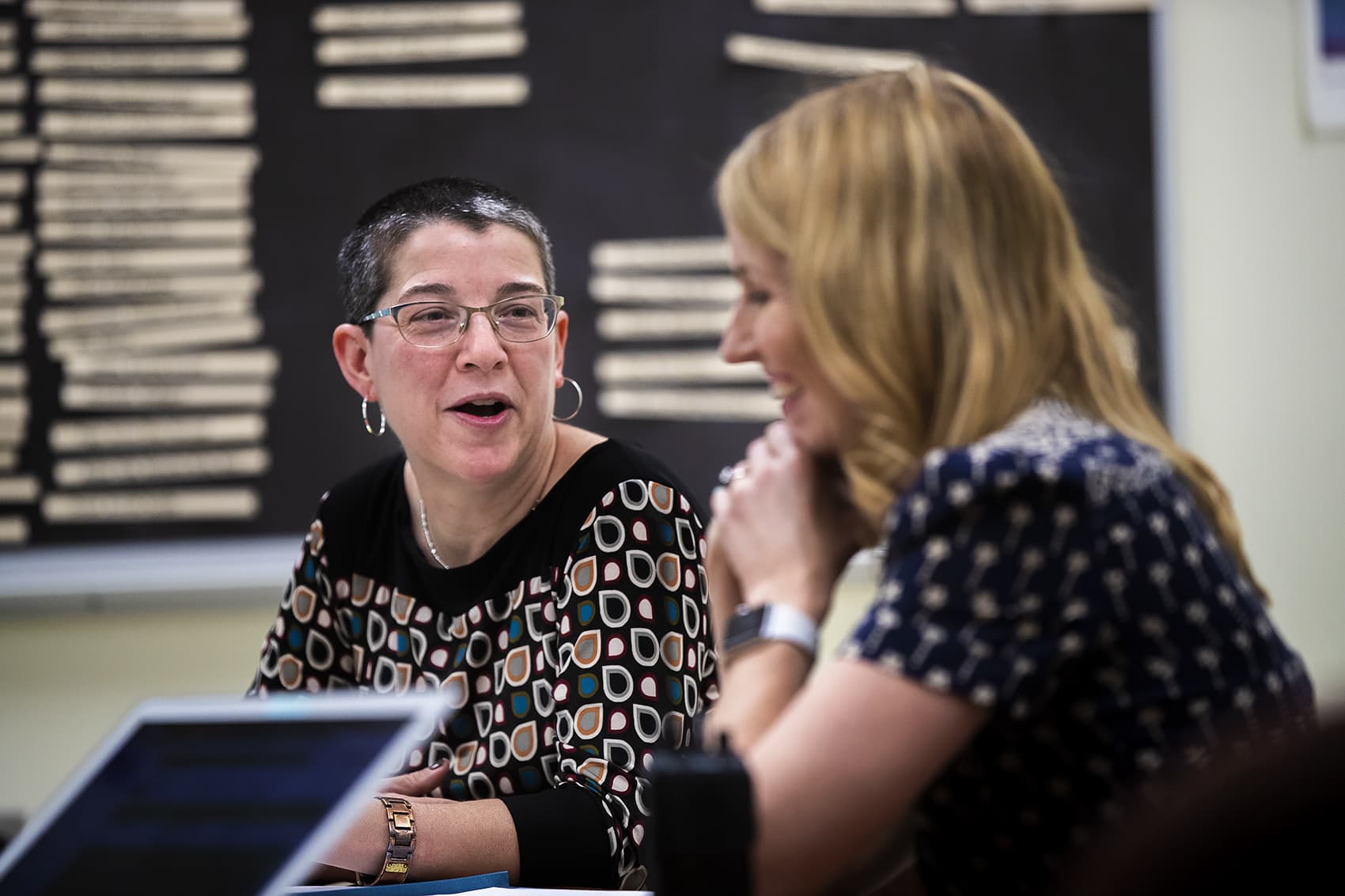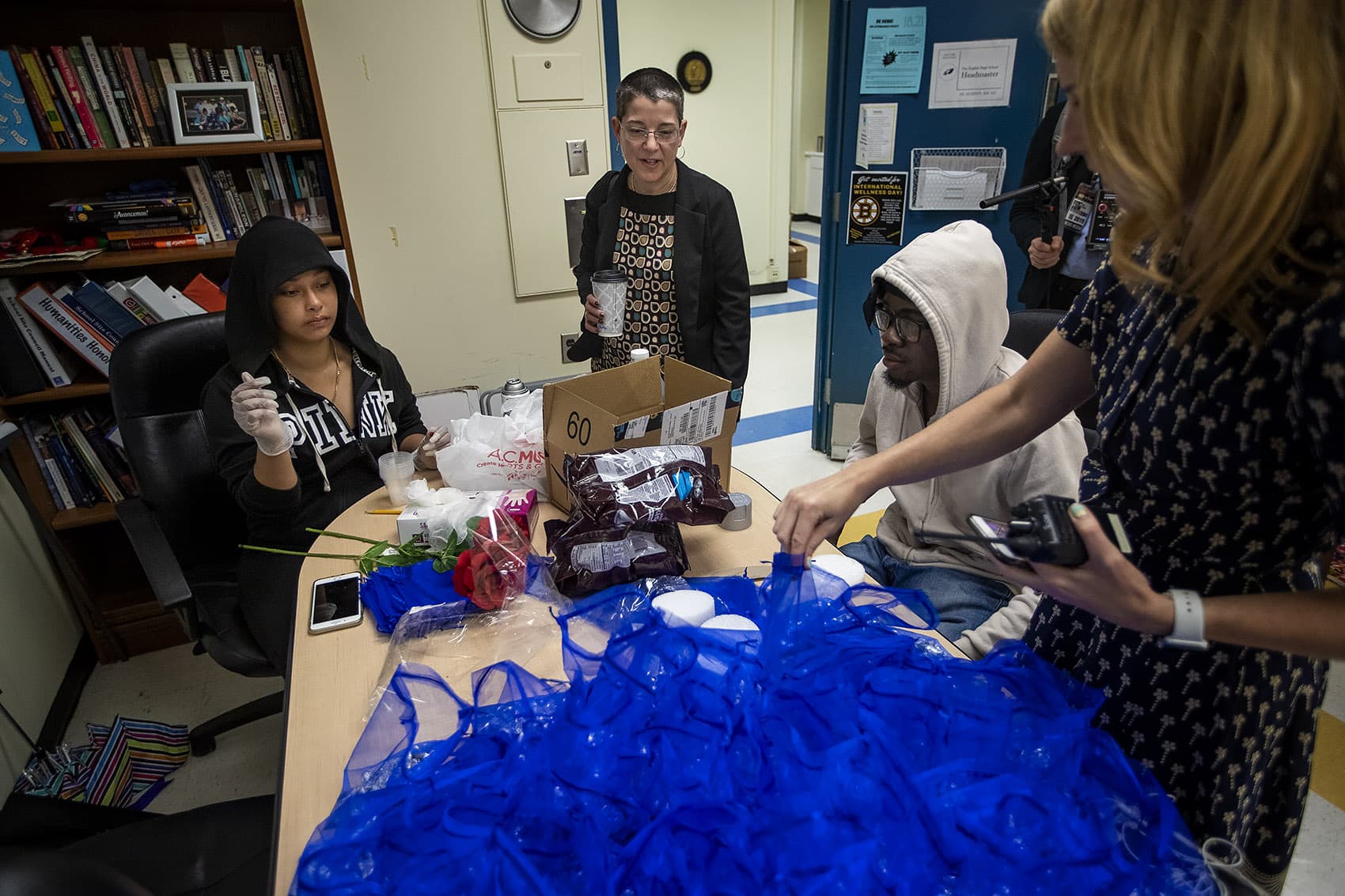Advertisement
Boston's Outgoing Superintendent Looks Back On A Year Of Hard Choices
Resume
Another school year in the books — another transition at the top of Boston Public Schools. Starting Monday, interim superintendent Laura Perille will pass the post on to Brenda Cassellius.
Cassellius — a lifelong educator and administrator — will be the seventh person to hold the post of superintendent since 2006.
Being superintendent can be an uncomfortable position: caught between an obligation to serve tens of thousands of students, teachers and families, and a duty to elected officials and advocates who want to see reform and improvement in the state's largest school district.
In her final weeks on the job, Perille spoke to WBUR about what makes the job such a challenge — and ultimately, so rewarding.
'55,000 Children!'
The BPS superintendent earns around $250,000 a year, and oversees a billion-dollar operation. And yet — in Boston, as in many other big urban districts — the job tends to wear people out pretty quickly.
First of all, Perille said, the "awesome responsibility" can be panic inducing. As she began last summer, she remembers telling friends, “I wake up every morning and I think, ‘55,000 children! 55,000 children!’” Perille sent so many early-morning emails that district staff wondered when she slept.
There is, of course, an element of unpredictability which requires rapid response: from late buses to lawsuits to an MCAS question many students judged to be racist.
Until last summer, Perille had spent her career in nonprofits: most notably as head of EdVestors, which supports "best practices for school improvement" in city schools and is backed by Boston philanthropists like Amos Hostetter and Seth Klarman.
Back then, Perille was mostly an MBTA commuter and walker. But after she was named superintendent, her family's one car became inadequate — "showing up," she explained, is essential.
So she and her husband bought a Ford hatchback that matched her specifications — small, efficient, American ("essentially a roller-skate,” she joked). As she steps down, Perille said she's logged 5,600 miles crisscrossing Boston over the course of the year.
Even over the course of a single hour, a superintendent can travel vast cultural distances in a city marked by such extreme inequality.
For instance, one morning earlier this month, Perille drove to a gilded boardroom full of philanthropists in the Back Bay to encourage continued investment in arts education — only minutes after leaving English High School in her own neighborhood of Jamaica Plain.

English High hosts several programs for students with acute disabilities, as well as many who travel back and forth from family homes in the Dominican Republic or elsewhere. Partly as a result of those "high-needs" demographics, it has struggled academically and been subject to state monitoring for nearly a decade.
Perille asked questions and offered encouragement in a meeting with English's principal, Caitlin Murphy, who spoke to promising results in the school's test scores — and a few ongoing struggles with chronic absenteeism and low graduation rates. Afterward, she checked in on English's marching band — the only one in the city's schools. Then she got back on the road.
Following a superintendent is a little like being on the campaign trail — except that Perille isn't keen to seek out the spotlight. She's in her element in meetings: sharing ideas, parsing data, working through an agenda.
“Laura is A-to-B. She's a straight line," said Mayor Marty Walsh, who said he appointed Perille without knowing her particularly well. There’s a sense of humor there, but also a strong drive, Walsh added: "She comes in here, she's very focused. She has her cards, her situations, the issues she wants to brief me on."
If she has a difficult job, Perille demurred, so do teachers: “They get very little recognition, and often little understanding of the complexity of their work."
Perille herself hasn't been an educator. She came to know BPS as head of EdVestors and the parent of two Boston Latin graduates. Many community members raised doubts as to whether Perille was prepared for the rigors of the job a year ago.
Parent Latasha Williams said the main thing she knew about the woman who'd be overseeing her children's schools was that "she's brought funds in" through her work at EdVestors. She added: "If she's good at that, well, make a position for her just for that! Give somebody else the position to run the schools!"
And for veteran activists like Bob Marshall, it was only the latest episode in a long trend of district leaders in circumventing the popular will. "I'm not even talking about [Perille]," Marshall said. "What I'm talking about is the process. It's people in a smoke-filled room, making decisions that impact our children."
As it happened, Perille did make big decisions this past year. First and foremost, she rebooted "BuildBPS," Mayor Walsh's billion-dollar overhaul of the district's buildings and school configurations.
Under her watch, BPS planned the gradual phase-out for the city's remaining middle schools, which have suffered from declining enrollment. To compensate, at least 16 elementary schools will expand to include a sixth grade.
'The Most Painful Thing'
Most dramatically, in October, Perille asked to close the two high schools inside the West Roxbury Education Complex (WREC) at the end of the school year. (Boston's school committee approved the decision two months later, and after their final graduations, the schools closed for good earlier this month.)
Perille said the WREC decision was "dropped in [her] lap" just a week after she got the job. City inspectors raised problems with the complex's roof, windows, masonry and HVAC system that had been exacerbated by heavy rain last spring. The district did $312,000 worth of emergency repairs, but ultimately, Perille said, they couldn't make the building safe for the long term.
"It is the most painful thing that one can do, to close a school," Perille said, "even if you don't have any good choices, which we did not in this case."
Walsh believes that sort of "bold" change is necessary to set BPS up for the 21st century. Still, he said Perille showed rare political courage in carrying it out.
"I think a lot of times, adjustments weren't made because of the advocacy or the concern of parent groups and teachers and everyone else," Walsh said. "Sometimes you just have to make those decisions. And Laura, when she was here, made those decisions."
If the closures were painful for Perille, they were devastating for the two schools' students and staff. Ultimately the district made few accommodations, allowing only rising seniors and specialized strands for students with acute disabilities to travel together next year.
Allison Doherty, who taught special education inside the WREC for 20 years, said the building really was in bad shape. But she argued that it got that way only after a parade of superintendents set the school up for failure, subjecting it to unworkable reforms even as they deferred necessary repairs.
By the end of this school year, Doherty said, much of the community had lost its trust in district leaders.
"Even if their intentions are pure," Doherty said, "It's kind of like 'The Boy Who Cried Wolf.' People feel like they've been burned so many times that they just don't believe anything that is said."
Doherty will not travel with students in the specialized program for autistic students she created years ago.
She said she and others felt vindicated last month, when blogger and advocate Alain Jehlen surfaced a draft report in November 2018 in which district officials say they might have leased temporary space to keep the WREC communities together but did not, citing an "overarching need for BPS... to right-size its high schools."
BPS's trust crisis isn't limited to West Roxbury; you come upon it across neighborhoods and generations.
For some it goes back decades, as far as the crisis over busing and school integration. Others cite more recent instances of double-speak. Back in 2015, district officials privately weighed a plan to close or consolidate dozens of city schools. (According to former education chief Rahn Dorsey, those plans never progressed very far, and were based on an erroneous analysis by the consulting firm McKinsey.)
And Perille's predecessor, Tommy Chang, tried to push through reforms — like reshuffling school start times or getting 'BuildBPS' underway — only to hold them back in the face of public resistance. After he lost the mayor's support, Chang resigned last summer, with little explanation.
A year later, even fewer people seem ready to criticize Perille personally. But both Doherty and Marshall called for a move to an elected school committee, as a means to foster public accountability that they see as lacking.
Being 'Planful'
Perille — born and raised in Illinois — has lived in Boston for more than 30 years. Still, she's not at peace with her adoptive hometown's native pessimism, what she called its "penchant for hanging on tightly to its narratives of mistrust and failure."
Asked what she would change about the job, Perille said she wished people were a little less skeptical, or more open to change. "It's a little simplistic to say 'assume good intentions,' because we all have had our hearts broken," Perille said. "But there's also dozens of examples of people pushing themselves to find solutions."
Perille argued that, since the disappointment at the WREC, she's tried to be one of those people. For example, her plan to close the McCormack Middle School in Dorchester met with fierce pushback from students and teachers. In response, district officials worked with the school to modify that plan. Now, the McCormack is set to merge with a high school on its original site in two years, and most people are satisfied.

It wasn't exactly elegant, but affected staff do credit Perille with listening and being flexible.
Maritza Ciliberto, principal of the Horace Mann School for the Deaf and Hard of Hearing, said she had to press Perille to find a better home for the school than its current building in Allston. But eventually, Ciliberto said, Perille did just that. Now the school is on track to move to a new location within two years.
"It was a leap of faith — she was a new person," Ciliberto said. "I just decided: ‘I'm going to trust [her].’ And I'm so glad I did."
Perille clearly hopes that what she calls her "planful" approach — giving people plenty of advance warning and opportunity for meaningful feedback — will guide other big changes down the road.
"So much of the work in Boston Public Schools is reactive — some of it because you never know what's going to happen," Perille said. "But there's also reacting when you just haven't analyzed the data -- haven't pushed yourself to figure out what's coming around the corner." With robust planning, she said, you can prevent "unintended firestorms."
Brenda Cassellius takes over on Monday. A career educator and administrator from Minnesota, she said in public interviews that she comes to Boston determined to listen and learn, even planning to give her personal cell phone number to anyone who requests it.
And for now, Perille plans to step away from the district completely. (She said she has no definite plans for her next role, though she said she discovered "an interest and a knack for public-sector management.") She encouraged Walsh to do away with his cabinet-level education position, in hopes that Cassellius will have a "clear field of play" as she establishes herself as a leader in a new and opinionated city.
Perille said she was grateful for the job, despite its stresses, the feeling that "every day matters." But starting this weekend, she said, she'll be on a vacation mandated by her husband — and wishing her successor the best of luck.
This segment aired on June 26, 2019.

